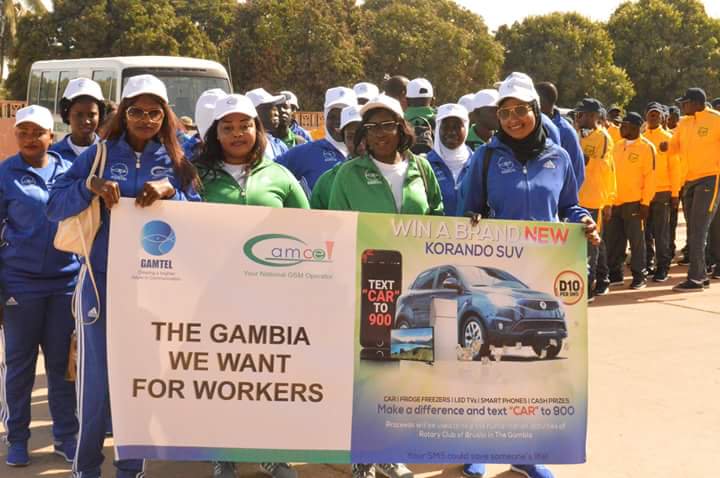
By Adama Makasuba
As International Workers’ Day or May Day is observed globally in different style, on Wednesday, the Gambia observed the day with a sporting events at the Independence Stadium in Bakau.
A country that is home to about 2 million people, in January 2015 changed its minimum wage to 50 dalasi per week ($1.25) a worker can be paid while the minimum basic salary is at 1000-1500 per month, and the country is part of the top 44 per cent of all countries based on the yearly minimum wage rate.
The minimum wage is the lowest amount a worker can be legally paid for his or her work.
Despite the Gambia government’s 50% increment on salary in January 2019, civil servants still struggle to make ends meet as many of them live from hand-to-mouth.
Every year different sectors including both government and private sectors gather at the national stadium to contest for various sporting events in observant of the Labour Day.
In his commemoration speech, Ebrima Garba Cham, secretary general of Gambia Workers Union urged government “to put in place a tripartite task force that will constantly monitor the implementation of policies with a view to addressing issues challenging workers.”
He assured the gathering of the continued support of the Gambia Workers Union to the work force, adding “we will response to the emerging issues within your work industries urgently in the best interest of the industrial fee.”
He called on Gambian workers to inculcate the spirit of peace and harmony at their work place to realize their objectives and potential to the fullest.
Mr. Cham also urged Gambian workers to adhere to the principle and practice of this tenet in accordance with international work standards, adding “you should embrace peace and love in your various workplaces.”
The Minister of Youths and Sports, Hadrammeh Sidibeh said “the government of the Gambia recognizes that the country’s most critical resource is its people who are not only the drivers of its people but the pinnacle of development agenda.”
According to him, “efforts are made to provide the necessary support for the development of the human capital which include reform of civil service, laws and the introduction of performance contract for the state own enterprises to enhance service delivery purposes.”
Meanwhile, youth’s unemployment rate in The Gambia stands at of 41.5 per cent from 38 per cent.










Recent Comments